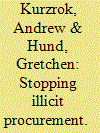|
|
|
Sort Order |
|
|
|
Items / Page
|
|
|
|
|
|
|
| Srl | Item |
| 1 |
ID:
160989


|
|
|
|
|
| Summary/Abstract |
The separation between export control and counterproliferation finance (CPF) efforts may be undermining governments’ ability to detect and stop weapons of mass destruction (WMD) proliferation. Using export-control information in screening financial transactions and using financial information in export-control decision making can be mutually reinforcing, each system feeding new information back to the other, creating a fuller picture of proliferation procurement networks. This article begins by identifying the US domestic agencies and international bodies involved in export controls and CPF, respectively, followed by a brief outline of the international and domestic sanctions regimes and export-control implementation. It then examines why financial information has historically not been considered relevant to export control and why export-control information is not regularly used to stop financial crime. The article then discusses the limitations of existing proliferation-finance guidance provided to financial institutions, as well as the problematic exclusion of marine insurance from US anti-money-laundering regulations and how it detracts from counterproliferation efforts. The authors conclude with a series of concrete options for better integrating export-control enforcement and combating proliferation finance, including options for both the US and the international community.
|
|
|
|
|
|
|
|
|
|
|
|
|
|
|
|
| 2 |
ID:
131599


|
|
|
|
|
| Publication |
2014.
|
| Summary/Abstract |
A Hollywood, Florida, conference of specialists in preventing, detecting, and responding to money laundering might not seem to be the most likely spot for the next innovation in nuclear nonproliferation policymaking. Yet, a March speech by Jennifer Shasky Calvery, director of the Department of the Treasury's Financial Crimes Enforcement Network (FinCEN), suggested an approach that regulators charged with stopping the proliferation of nuclear weapons would do well to study. Shasky Calvery stated that "FinCEN needs to find ways for more dynamic, real-time information sharing, both by and between financial institutions, and with FinCEN and law enforcement."[1] The information to which she was referring is transaction data related to money laundering that currently reside within banks, casinos, credit card processing companies, and many other types of financial businesses. Export control regulators could apply Shasky Calvery's approach to their own mission. In the nonproliferation context, FinCEN's anti-money laundering data would be analogous to the inquiries that potential buyers of dual-use commodities place over the phone or on commercial websites. Dual-use commodities have legitimate civilian applications, but can also be used to support nuclear weapons development. If a request appears suspicious, most firms will decline the request. Unlike their counterparts in the financial sector, however, export control regulators and private business have few tools with which to gather and disseminate this critical information about the networks illicitly seeking strategic commodities. Taking a page from the anti-money laundering playbook may help stop proliferation procurement.
|
|
|
|
|
|
|
|
|
|
|
|
|
|
|
|
|
|
|
|
|